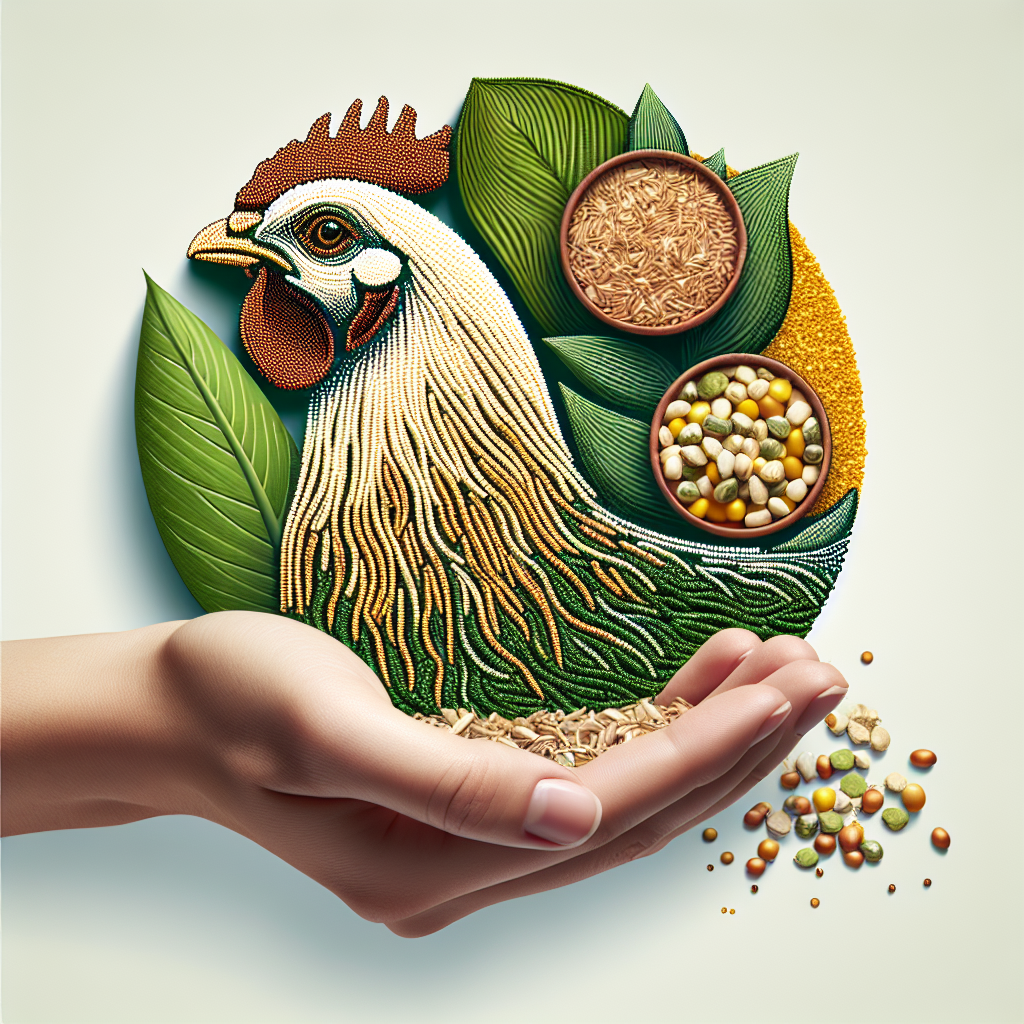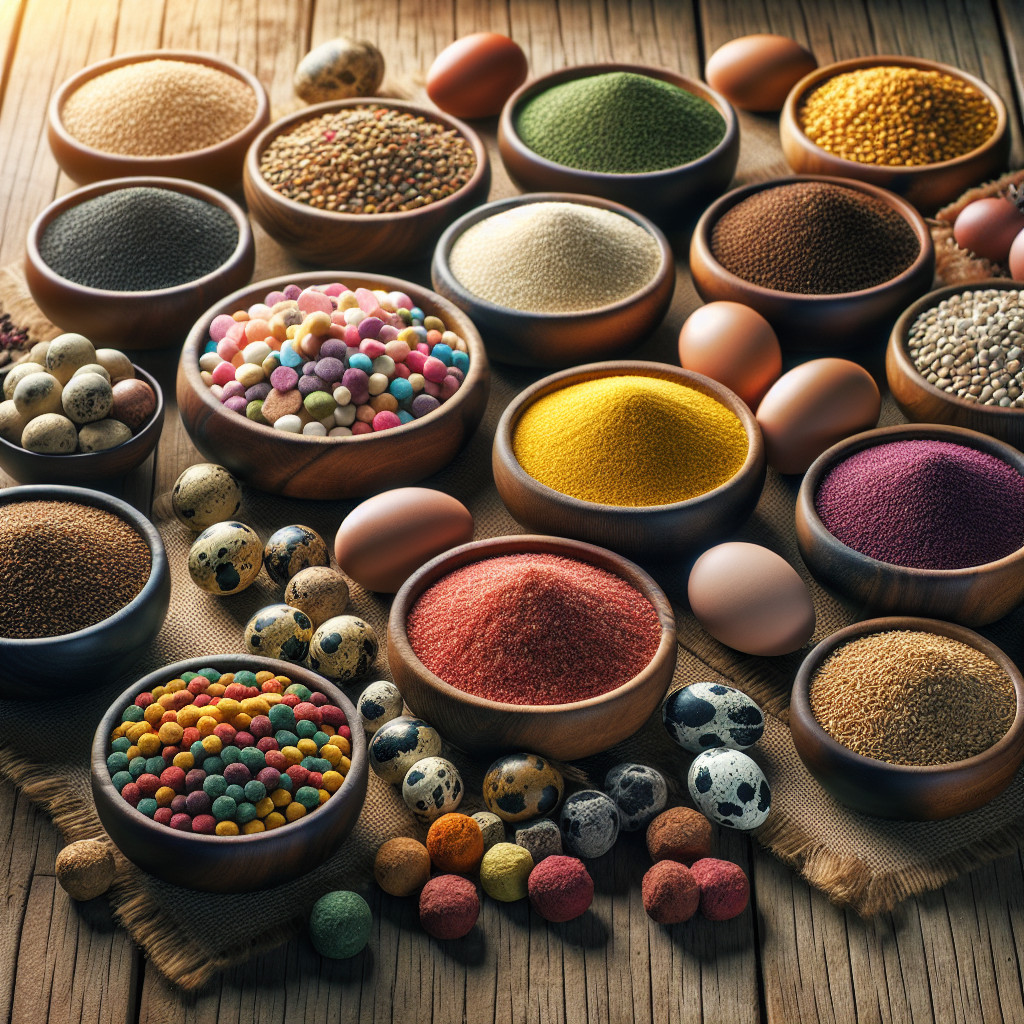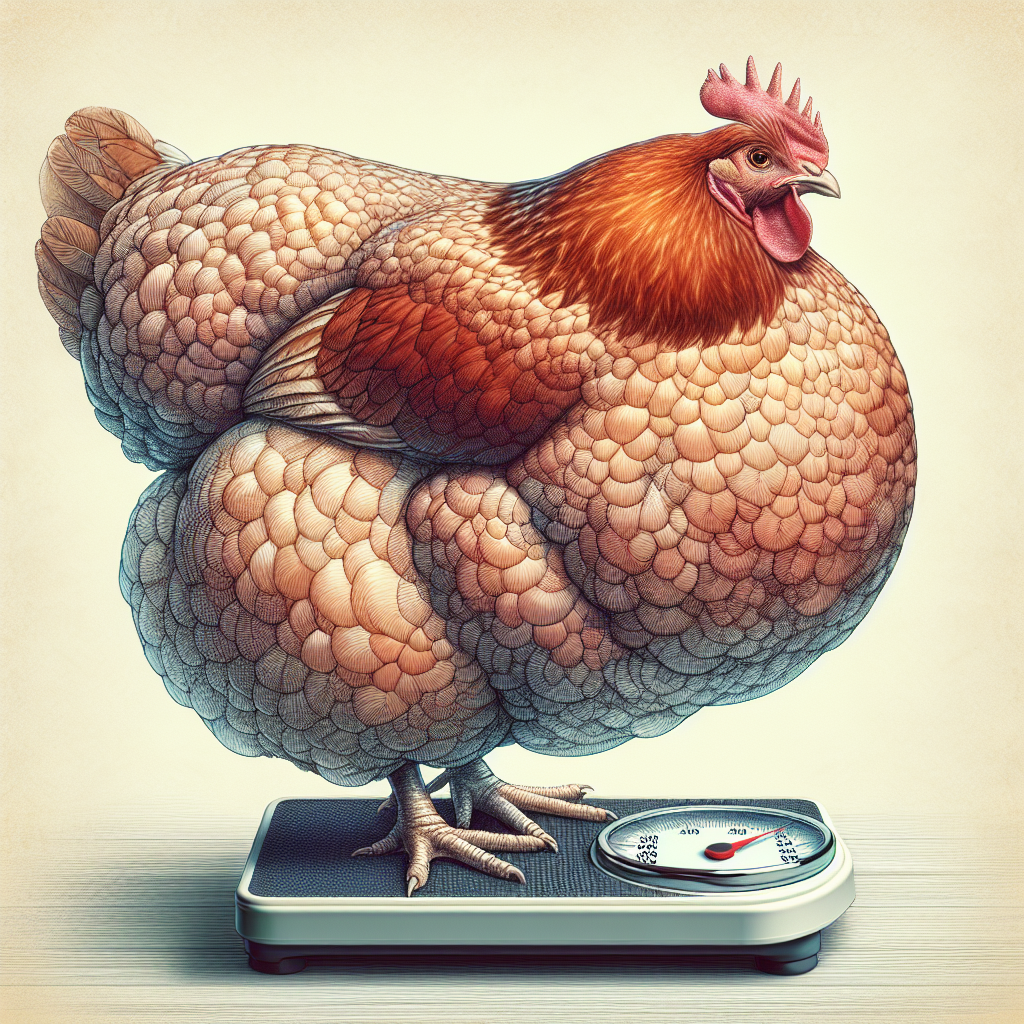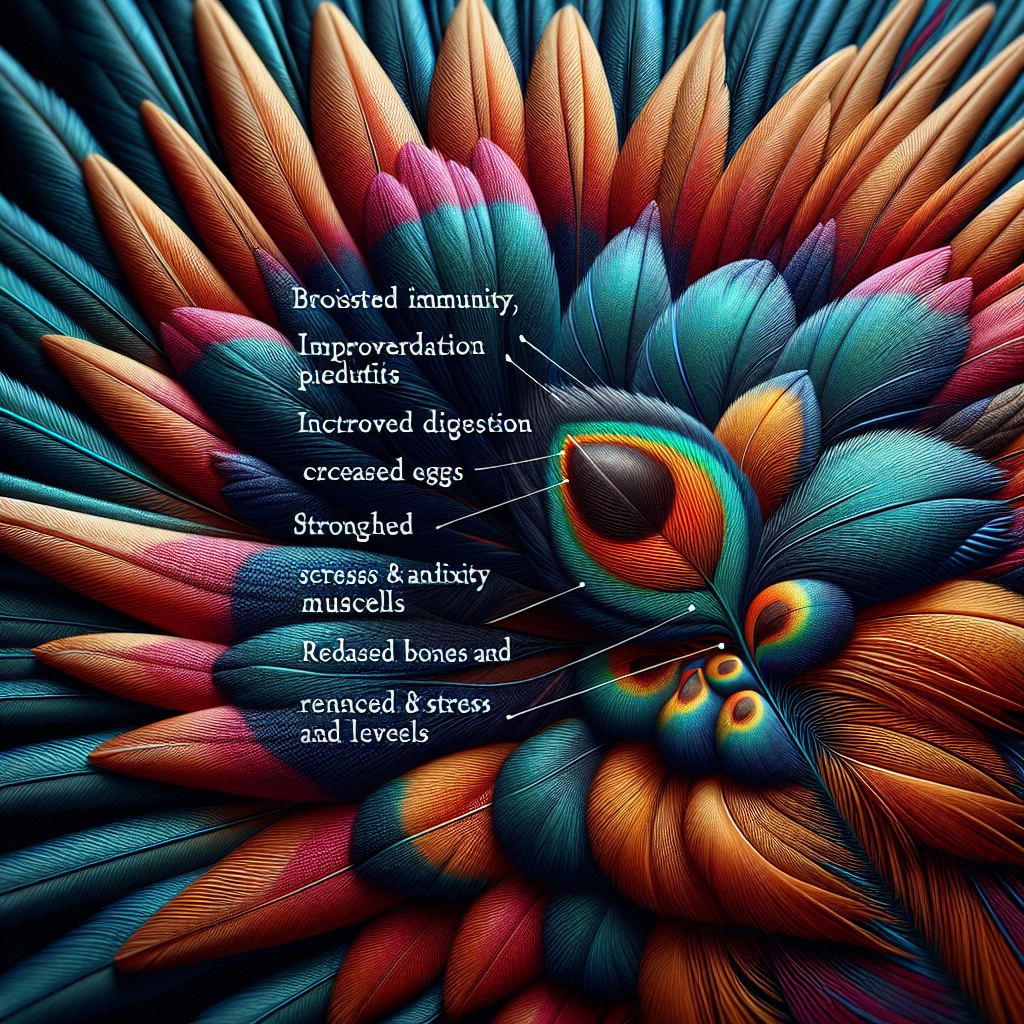If you’ve ever wondered whether there are sustainable or eco-friendly feed options out there for chickens, then you’re in for a treat. As awareness about environmentally friendly practices continues to grow, so does the demand for sustainable alternatives in various industries, including poultry farming. In this article, we will explore the exciting world of sustainable feed options for chickens, showcasing the innovative solutions that are not only better for the planet but also for the overall health and well-being of our feathered friends. So, let’s take a closer look at how we can make a positive impact on both the chickens and the environment through conscious feeding choices.
Sustainable Feed Options
Nutritious and Locally Sourced Feeds
When it comes to providing sustainable feeds for your chickens, it’s important to consider options that are both nutritious and locally sourced. By opting for feeds that are produced within your local community, you can significantly reduce the carbon footprint associated with transportation and support local farmers as well. These feeds are often made from high-quality ingredients that provide the necessary nutrients for your chickens to thrive.
Organic Feeds
Organic feeds are another excellent option for those seeking sustainable feed alternatives for their chickens. These feeds are made from organic ingredients, which means they are free from harmful chemicals, pesticides, and synthetic additives. By choosing organic feeds, you are not only promoting the well-being of your chickens but also supporting environmentally friendly farming practices that prioritize the health of the soil, water, and ecosystems.
Non-GMO Feeds
Genetically modified organisms (GMOs) have become a topic of concern for many people, and this applies to chicken feed as well. Non-GMO feeds are a sustainable choice for those looking to avoid GMOs and their potential environmental impacts. By opting for non-GMO feeds, you are supporting sustainable farming practices and contributing to the preservation of biodiversity.
Insect-Based Feeds
In recent years, there has been a growing interest in insect-based feeds as sustainable alternatives for chickens. Insects are an abundant and highly nutritious food source that can be sustainably produced on a large scale. Insect-based feeds not only provide the necessary nutrients for chickens but also offer a more sustainable protein source compared to traditional feeds.
Seaweed and Algae Feeds
Seaweed and algae are rich sources of essential nutrients and have gained attention as sustainable feed options for chickens. These feeds are not only nutritious but also have the advantage of being grown in marine environments, minimizing the strain on freshwater resources. By incorporating seaweed and algae feeds into your chickens’ diet, you can contribute to the preservation of water resources while providing a balanced and eco-friendly feed option.
Eco-friendly Feed Options
Recycled Food Waste Feeds
Recycled food waste feeds offer a unique and innovative solution for sustainable chicken feed. By utilizing food waste that would otherwise end up in landfills, these feeds help reduce environmental impact and promote circular economy principles. From leftover fruits and vegetables to bakery scraps, recycled food waste feeds present an eco-friendly option that also reduces waste and the associated greenhouse gas emissions.
Plant-Based Feeds
Plant-based feeds are a popular choice for those seeking eco-friendly alternatives. These feeds are typically made from a blend of grains, legumes, and other plant sources, providing a balanced and sustainable diet for chickens. By opting for plant-based feeds, you are reducing the strain on land and water resources associated with animal agriculture while promoting a more environmentally friendly food system.
Ethical Byproduct Feeds
Ethical byproduct feeds are made from byproducts generated by various industries, such as the brewing or milling industry. By utilizing these byproducts as chicken feed, you are diverting waste from landfills and reducing the environmental impact of these industries. Additionally, these feeds often come at a lower cost, making them a cost-effective and sustainable choice for chicken owners.
Fermented Feeds
Fermented feeds offer several benefits from an eco-friendly standpoint. By fermenting grains and other feed ingredients, you can enhance their nutrient availability and improve digestion for your chickens. This process also helps reduce waste and prevent the buildup of harmful pathogens. Fermented feeds are a sustainable alternative that promotes chicken health while minimizing environmental impact.
Homegrown Feeds
If you have the space and resources, growing your own feed can be an excellent sustainable option. By planting crops such as corn, soybeans, or sunflowers, you can provide your chickens with fresh, homegrown feed. Not only does this reduce transportation emissions, but it also allows you to have full control over the cultivation process, ensuring the sustainability and quality of the feed.
Environmental Benefits
Reduced Carbon Footprint
One of the primary environmental benefits of using sustainable and eco-friendly feed options for your chickens is the reduction in carbon footprint. By opting for locally sourced feeds or growing your own, you eliminate the need for long-distance transportation, which often involves the burning of fossil fuels. Choosing feed options that prioritize sustainable farming practices also helps reduce greenhouse gas emissions associated with conventional agriculture.
Preservation of Biodiversity
By choosing sustainable feed options, you contribute to the preservation of biodiversity. Traditional feed production methods often rely on intensive agricultural practices that can have negative impacts on ecosystems and wildlife. Sustainable feeds, on the other hand, promote environmentally friendly farming techniques that prioritize biodiversity conservation. By supporting sustainable feed options, you are actively contributing to the protection of natural habitats and the countless species that depend on them.
Water Conservation
Water conservation is another crucial environmental benefit associated with sustainable feed options for chickens. Conventional feed production requires significant amounts of water for irrigation, crop cultivation, and livestock rearing. By opting for eco-friendly feed alternatives, such as seaweed and algae feeds or plant-based feeds, you reduce the strain on freshwater resources. Additionally, sustainable farming practices often incorporate water-saving techniques, further contributing to water conservation efforts.
Nutritional Considerations
Balanced Diet Requirements
When selecting sustainable feed options for your chickens, it’s essential to ensure they meet the necessary nutritional requirements. A balanced diet for chickens should include a mix of carbohydrates, proteins, fats, vitamins, and minerals. Pay attention to the composition and ingredients of the feeds you choose to ensure they provide a well-rounded diet for your chickens.
Adequate Protein Content
Protein is a vital nutrient for chickens, as it is necessary for growth, egg production, and overall health. When selecting sustainable feeds, ensure they contain adequate protein content to meet your chickens’ needs. Insect-based feeds are an excellent option as they are rich in protein and offer a sustainable alternative to traditional protein sources.
Essential Vitamins and Minerals
Chickens require a range of essential vitamins and minerals to maintain their health and productivity. Look for feeds that are enriched with vitamins and minerals, or consider supplementing with natural sources such as fruits, vegetables, or kitchen scraps. By providing a diverse diet, you can ensure your chickens receive the necessary nutrients to thrive.
Long-chain Omega-3 Fatty Acids
Long-chain omega-3 fatty acids are beneficial for both chickens and consumers. These fatty acids are known for their potential health benefits, including reducing inflammation and improving cardiovascular health. Sustainable feed options, such as feeds enriched with flaxseed or other plant sources, can provide a natural source of omega-3 fatty acids for your chickens.
Cost Considerations
Comparison of Feed Prices
When considering sustainable feed options, it’s essential to compare prices and evaluate the cost implications. Sustainable feeds may sometimes come at a slightly higher price point compared to conventional feeds due to the higher quality ingredients or production methods involved. However, it’s important to consider the long-term benefits and potential cost savings that can result from healthier and more productive chickens.
Long-term Cost Analysis
While sustainable feeds may require a higher upfront investment, conducting a long-term cost analysis can help determine the overall economic viability. Factors such as improved chicken health, increased egg production, and reduced veterinarian costs can contribute to long-term savings. Additionally, some sustainable feed options, like homegrown feeds or ethical byproduct feeds, can be more cost-effective alternatives.
Economical Alternatives
If cost is a significant concern, there are several economical alternatives to consider. For example, recycled food waste feeds offer a cost-effective option by utilizing waste products that would otherwise be discarded. Additionally, choosing locally sourced feeds can help reduce transportation costs and support local farmers, potentially resulting in more competitive prices.
Availability and Sourcing
Local Market Access
When searching for sustainable feed options, it’s beneficial to explore local market access. Local farmers’ markets, feed stores, or agricultural cooperatives may offer a variety of sustainable feed options. By purchasing locally, you support your community, reduce transportation emissions, and have the opportunity to directly ask farmers questions about their practices and sourcing.
Online Feed Suppliers
In today’s digital age, online feed suppliers can provide a convenient and accessible way to access a wide range of sustainable feed options. Online platforms may offer a wide selection of feeds, including organic, non-GMO, or specialty feeds. Ensure you research the supplier’s sustainability credentials and read reviews from other customers to ensure the feed’s quality and integrity.
DIY Feed Production
For those looking for a truly hands-on approach, DIY feed production can be a viable option. By growing your own grains, legumes, or other feed ingredients, you can have complete control over the sourcing, cultivation, and production process. DIY feed production allows you to customize your chickens’ diet according to their specific needs while ensuring sustainability and reducing costs.
Challenges and Limitations
Limited Supply and Variety
One of the challenges associated with sustainable feed options for chickens is the limited supply and variety available in certain regions. Depending on your location, it may be more challenging to find niche or specialty feeds. However, as the demand for sustainable options continues to grow, more suppliers may start offering a wider range of feed choices.
Higher Cost of Sustainable Feeds
As mentioned earlier, sustainable feeds may come at a higher cost compared to conventional feeds. This can pose a limitation for some chicken owners, particularly those operating on a tight budget. However, it’s important to consider the long-term benefits and potential cost savings that sustainable feeds can offer, as well as exploring more economical alternatives within the sustainable feed market.
Transitioning to New Feed Options
Transitioning to new feed options can pose challenges for both chickens and chicken owners. Chickens may take time to adjust to new flavors and textures, which can impact their feed consumption and production. Additionally, chicken owners may need to invest time and effort into researching, sourcing, and gradually introducing new feeds to their poultry. Patience and gradual transitions are key to successfully implementing sustainable feed options.
Lack of Regulation and Certifications
The lack of robust regulations and certifications specific to sustainable chicken feeds can make it challenging for consumers to make informed choices. While organic certifications exist, other sustainable practices or eco-friendly feed options may not have specific certifications. It’s important to research suppliers, ask questions, and seek transparency regarding their farming practices, sourcing, and product integrity.
Impacts on Chicken Health and Productivity
Growth Rate and Weight Gain
Using sustainable feed options can positively impact chicken health and productivity. High-quality and nutrient-rich feeds can support optimal growth rates and weight gain for chickens. Additionally, sustainable feeds that prioritize balanced nutrition can help ensure chickens reach their full potential in terms of size and weight, which is important for meat production.
Egg Quality and Quantity
Sustainable feed options can also have a significant impact on egg quality and quantity. Feeds rich in essential vitamins, minerals, and omega-3 fatty acids can contribute to improved egg quality in terms of shell strength, yolk color, and overall nutritional value. Moreover, a well-balanced diet can enhance egg production rates, resulting in a more productive laying flock.
Disease Resistance
Chickens provided with sustainable and eco-friendly feeds may demonstrate improved disease resistance. High-quality feeds that promote optimal nutrition and a strong immune system can help chickens fend off common diseases and infections. Additionally, certain sustainable feed options, such as fermented feeds, can support a healthy gut microbiome, contributing to disease prevention.
Consumer Attitudes and Preferences
Demand for Sustainable and Eco-friendly Products
Consumer attitudes and preferences play a vital role in driving the availability and adoption of sustainable feed options for chickens. There is an increasing demand for sustainable and eco-friendly products, including those related to animal husbandry. As more chicken owners prioritize sustainability and ethical considerations, suppliers are encouraged to expand their offerings and meet the growing market needs.
Labeling and Certification
Clear labeling and reliable certifications can greatly assist consumers in identifying and selecting sustainable feed options. Organic certifications provide assurance regarding the absence of harmful chemicals and synthetic additives. While specific certifications for sustainable feeds may be limited, transparent labeling that highlights key attributes, sourcing practices, and environmental benefits can help consumers make informed choices.
Future Directions
Research and Innovation
The future of sustainable chicken feeds lies in continuous research and innovation. Scientists and agricultural experts are constantly exploring new feed ingredients, production methods, and techniques that offer both sustainability and nutritional benefits. Continued research can pave the way for even more eco-friendly feed options that are tailored to meet the specific needs of chickens and minimize environmental impact.
Collaboration and Knowledge Sharing
Collaboration and knowledge sharing among farmers, researchers, and feed suppliers are crucial for advancing sustainable feed options. By sharing best practices, success stories, and lessons learned, stakeholders can collectively work towards creating a more sustainable and resilient food system. Collaborative efforts can also encourage the development of standards, certifications, and regulations specific to sustainable chicken feeds.
Policy and Regulatory Intervention
Policy and regulatory intervention can play a significant role in promoting and supporting sustainable feed options for chickens. Governments and regulatory bodies can incentivize sustainable farming practices, provide research funding, and enforce standards that ensure the integrity and sustainability of feeds. Engaging policymakers and advocating for sustainable agriculture can accelerate the adoption of eco-friendly feed options and create a more sustainable future for the poultry industry.




